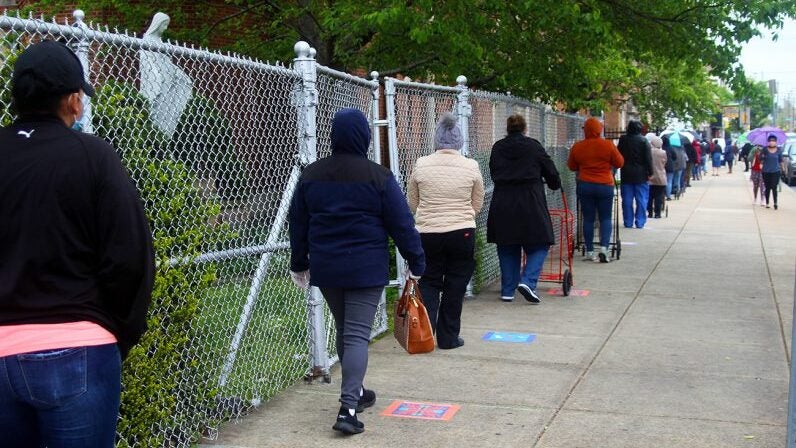

For Philadelphia resident Tracey Trapp, the coronavirus pandemic has been a time of “waiting for the other shoe to drop.”
An industrial dry cleaner from the city’s Harrowgate section, Trapp and his wife, a caretaker, have both just lost their jobs. A loved one recently died of COVID-19; Trapp prays his adult son, who survived the disease, doesn’t become reinfected at the grocery store where he works.
Trapp himself battles Crohn’s disease, colitis — and the state’s unemployment office, which has denied his benefits claim. Meanwhile, the Internal Revenue Service hasn’t yet processed his stimulus check.
“We’re just trying to make ends meet,” said Trapp, whose next rent payment is looming. “It’s like stretching a rubber band that keeps popping back.”
Some of that tension, he said, is being relieved by a twice-weekly food distribution program at St. Joan of Arc Mission Church in Philadelphia.
Part of Holy Innocents Parish, St. Joan of Arc has become a vital outreach in the fight against pandemic-related hunger, providing federally funded meals supplied by archdiocesan Nutritional Development Services (NDS) and donated foods from Philabundance, SharePhilly and the City of Philadelphia.
On a rainy April morning this week, Trapp waited patiently for supplies in a socially distanced line of clients that stretched around the block of the church.
Sister of St. Joseph Linda Lukiewski, who directs St. Joan of Arc’s day-to-day pastoral ministries, said the surge in clients marks “a new normal” at the century-old church.
“We started out earlier this month with 70 boxed meals from NDS,” she said. “It went up pretty quickly to 100, and now we’re up to 975 boxes, twice a week.”
In the meantime, Philabundance and SharePhilly, working with the city, began delivering dry goods and produce to the site, enabling households without children to receive assistance as well.
The coronavirus pandemic has compounded Philadelphia’s long struggle with poverty, which stood at 24.5% in 2018, and food insecurity, which rose 22% from 2012 to 2017.
Hunger relief agencies have been collaborating even more closely as a result of the coronavirus crisis, moving quickly to “fill the gaps” created by the emergency, said Erinn J. Hill, NDS’s director of federal programs.
“When the schools closed, we pivoted to emergency feeding for children, using the federal child nutrition dollars,” said Hill, adding that NDS — which also has its own community food pantry program — is providing the kids’ meals at 80 sites throughout the five-county area. “We’ve adapted deliveries and menus, but it’s really the partners who have stepped up to make this distribution possible.”
With some sites receiving up to 3,900 meals per NDS delivery, “the collaboration between city distribution points and the NDS-administered child nutrition programs” is a highly efficient one, she said.
“People are coming out one time, to one location, and they’re able to access both opportunities to receive food assistance,” said Hill, who credited the sites’ well-organized distribution processes and dedicated volunteers.
A number of parishioners from St. Joan of Arc and Holy Innocents have been assisting with the outreach, quickly handing bags and boxes to clients from across six-foot-tables while keeping the line moving.
Sister Linda said that despite the face masks and gloves, the volunteers — some of whom receive aid from the ministry — “risk their lives” to serve their neighbors in need.
“They don’t have to do this, and I don’t want to sound dramatic, but it touches my heart,” she said. “I keep thinking, ‘If any of us get COVID…’, but they really want to help.”
With unemployment throughout the nation soaring, “rent is going to be the next concern,” she said, which is why she has started saving monetary donations toward a rental assistance fund.
“I don’t have a whole lot of money set aside, but we’ve always helped people along the way,” said Sister Linda.
The pandemic is increasingly “forcing people to make choices between paying utilities and food” while straining their mental health, she noted.
“People’s nerves become shot, living locked down in a little house with four kids,” she said.
NDS executive director Lizanne Hagedorn admitted that in her four decades of addressing food insecurity, she had never seen a crisis with such a far-reaching impact.
“When we’ve had downturns in the economy, we’ve naturally seen an increase in the need for our service,” she said. “But this is the first time where everyone is affected, and the consequences will reverberate for years.”
She and Hill, along with the NDS team, are prepared for the long haul, which will require them to remain open to new ways of fighting hunger.
“I think so many of the things we’ve relied on in our lives are going to change,” said Hagedorn. “Nothing is going to be the same.”
[This article written by Gina Christian appeared originally at CatholicPhilly.com and is used with permission of the author.]








